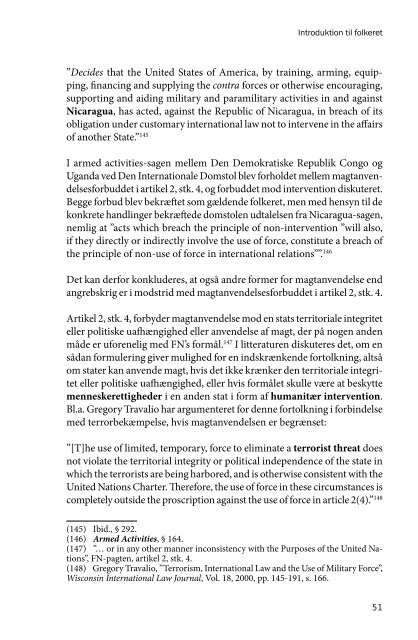Introduktion-til-folkeret
Introduktion-til-folkeret
Introduktion-til-folkeret
Create successful ePaper yourself
Turn your PDF publications into a flip-book with our unique Google optimized e-Paper software.
<strong>Introduktion</strong> <strong>til</strong> <strong>folkeret</strong><br />
”Decides that the United States of America, by training, arming, equipping,<br />
financing and supplying the contra forces or otherwise encouraging,<br />
supporting and aiding military and paramilitary activities in and against<br />
Nicaragua, has acted, against the Republic of Nicaragua, in breach of its<br />
obligation under customary international law not to intervene in the affairs<br />
of another State.” 145<br />
I armed activities-sagen mellem Den Demokratiske Republik Congo og<br />
Uganda ved Den Internationale Domstol blev forholdet mellem magtanvendelsesforbuddet<br />
i artikel 2, stk. 4, og forbuddet mod intervention diskuteret.<br />
Begge forbud blev bekræftet som gældende <strong>folkeret</strong>, men med hensyn <strong>til</strong> de<br />
konkrete handlinger bekræftede domstolen udtalelsen fra Nicaragua-sagen,<br />
nemlig at ”acts which breach the principle of non-intervention ”will also,<br />
if they directly or indirectly involve the use of force, constitute a breach of<br />
the principle of non-use of force in international relations””. 146<br />
Det kan derfor konkluderes, at også andre former for magtanvendelse end<br />
angrebskrig er i modstrid med magtanvendelsesforbuddet i artikel 2, stk. 4.<br />
Artikel 2, stk. 4, forbyder magtanvendelse mod en stats territoriale integritet<br />
eller politiske uafhængighed eller anvendelse af magt, der på nogen anden<br />
måde er uforenelig med FN’s formål. 147 I litteraturen diskuteres det, om en<br />
sådan formulering giver mulighed for en indskrænkende fortolkning, altså<br />
om stater kan anvende magt, hvis det ikke krænker den territoriale integritet<br />
eller politiske uafhængighed, eller hvis formålet skulle være at beskytte<br />
menneskerettigheder i en anden stat i form af humanitær intervention.<br />
Bl.a. Gregory Travalio har argumenteret for denne fortolkning i forbindelse<br />
med terrorbekæmpelse, hvis magtanvendelsen er begrænset:<br />
”[T]he use of limited, temporary, force to eliminate a terrorist threat does<br />
not violate the territorial integrity or political independence of the state in<br />
which the terrorists are being harbored, and is otherwise consistent with the<br />
United Nations Charter. Therefore, the use of force in these circumstances is<br />
completely outside the proscription against the use of force in article 2(4).” 148<br />
(145) Ibid., § 292.<br />
(146) Armed Activities, § 164.<br />
(147) ”… or in any other manner inconsistency with the Purposes of the United Nations”,<br />
FN-pagten, artikel 2, stk. 4.<br />
(148) Gregory Travalio, ”Terrorism, International Law and the Use of Military Force”,<br />
Wisconsin International Law Journal, Vol. 18, 2000, pp. 145-191, s. 166.<br />
51


